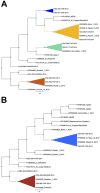Middle East respiratory syndrome coronavirus infection in dromedary camels in Saudi Arabia
- PMID: 24570370
- PMCID: PMC3940034
- DOI: 10.1128/mBio.00884-14
Middle East respiratory syndrome coronavirus infection in dromedary camels in Saudi Arabia
Erratum in
- MBio. 2014;5(2):e01002-14. Burbelo, Peter D [added]
Abstract
The Middle East respiratory syndrome (MERS) is proposed to be a zoonotic disease; however, the reservoir and mechanism for transmission of the causative agent, the MERS coronavirus, are unknown. Dromedary camels have been implicated through reports that some victims have been exposed to camels, camels in areas where the disease has emerged have antibodies to the virus, and viral sequences have been recovered from camels in association with outbreaks of the disease among humans. Nonetheless, whether camels mediate transmission to humans is unresolved. Here we provide evidence from a geographic and temporal survey of camels in the Kingdom of Saudi Arabia that MERS coronaviruses have been circulating in camels since at least 1992, are distributed countrywide, and can be phylogenetically classified into clades that correlate with outbreaks of the disease among humans. We found no evidence of infection in domestic sheep or domestic goats. IMPORTANCE This study was undertaken to determine the historical and current prevalence of Middle East respiratory syndrome (MERS) coronavirus infection in dromedary camels and other livestock in the Kingdom of Saudi Arabia, where the index case and the majority of cases of MERS have been reported.
Figures



Comment in
-
Concerns about misinterpretation of recent scientific data implicating dromedary camels in epidemiology of Middle East respiratory syndrome (MERS).mBio. 2014 Jul 8;5(4):e01430-14. doi: 10.1128/mBio.01430-14. mBio. 2014. PMID: 25006231 Free PMC article. No abstract available.
-
Reply to "Concerns about misinterpretation of recent scientific data implicating dromedary camels in epidemiology of Middle East respiratory syndrome (MERS)".mBio. 2014 Jul 8;5(4):e01482-14. doi: 10.1128/mBio.01482-14. mBio. 2014. PMID: 25006235 Free PMC article. No abstract available.
-
The origins of viruses: discovery takes time, international resources, and cooperation.Lancet. 2021 Oct 16;398(10309):1401-1402. doi: 10.1016/S0140-6736(21)02180-2. Epub 2021 Sep 30. Lancet. 2021. PMID: 34600605 Free PMC article. No abstract available.
References
-
- WHO 2013. Middle East respiratory syndrome coronavirus (MERS-CoV)—update. World Health Organization, Geneva, Switzerland: http://www.who.int/csr/don/2013_12_27/en/index.html?utm_source=twitterfe...
-
- Assiri A, McGeer A, Perl TM, Price CS, Al Rabeeah AA, Cummings DA, Alabdullatif ZN, Assad M, Almulhim A, Makhdoom H, Madani H, Alhakeem R, Al-Tawfiq JA, Cotten M, Watson SJ, Kellam P, Zumla AI, Memish ZA, Team KM-CI 2013. Hospital outbreak of Middle East respiratory syndrome coronavirus. N. Engl. J. Med. 369:407–416. 10.1056/NEJMoa1306742 - DOI - PMC - PubMed
Publication types
MeSH terms
Substances
Associated data
- Actions
- Actions
- Actions
- Actions
- Actions
- Actions
- Actions
- Actions
- Actions
- Actions
- Actions
- Actions
- Actions
- Actions
- Actions
- Actions
Grants and funding
LinkOut - more resources
Full Text Sources
Other Literature Sources
Medical

